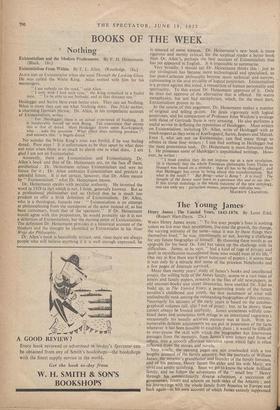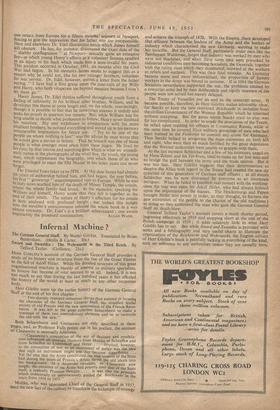The Young James.
Henry James : The Untried Years, 1843-1870. By Leon Edel. (Rupert Hart-Davis. 25s.) More than twenty years' study of James's books and uncollected essays, the willing help of the James family, access to a vast mass of letters and family papers, research in the files of old newspapers, in old account-books and street directories, have enabled Dr. Edel to build up, in The Untried Years, a penetrating study of the future novelist's childhood and youth, the first instalment of what will undoubtedly rank among the outstanding biographies of this century. Necessarily his account of the early years is based on the autobio- graphical volumes (all, alas ! out of print) ; but, as he shows, these cannot always be trusted implicitly. James sometimes wilfully con- fused dates and sometimes took refuge in an intentional vagueness ; occasionally his usually accurate memory was at fault. With in- numerable delicate adjustments we are put in possession of the facts whenever it has been possible to establish them ; it would be difficult to over-praise the skill with which the biographer has interwoven passages from the memoirs, from James's own letters and those of others, into a smooth effortless narrative upon .which light is often reflected from the stories and novels.
Very wisely, the opening pages are not overloaded With a too lengthy account of the family ancestry, but the portraits of William James, the novelist's grandfather and founder of the family fortunes, and of his parents, Henry James the elder and his wife Mary, are vivid and amply satisfying. Soon we. get to know the whole brilliant family, and we follow the adventures of the " small boy " Henry through his extraordinarily diverse education, a succession of governesses, tutors and schools on both sides of the Atlantic ; and his journeyings with the whole family from America to Europe and back again—in his own account of which James entirely suppressed WHEN Henry James wrote : " To live over people's lives is nothing unless we live over their perceptions, live over the growth, the change, the varying intensity of the same—since it was by these things they themselves lived," he was, intentionally or not, leaving a challenge for any future biographer of himself. By choosing these words as an epigraph for his book Dr. Edel has taken up the challenge with its difficulties. James, as he says, " had a kind of rage of privacy and dealt in mystification to,confound those who would treat of his life." One day at Rye there was. a great holocaust of papers ; it seems that it was only by a miracle that some of the priceless Notebooks and a few pages of Journals survived.
one return from Europe for a fifteen months' sojourn at Newport, fearing to give the impression that his father was too irresponsible. Here and elsewhere Dr. Edel illuminates much which James himself left obscure. He has, for instance, discovered the exact date of the " shabby conflagration " at Newport—actually quite an extensive fire—at which young Henry's efforts as a volunteer fireman resulted in an injury to his back which made him a semi-invalid for years. This accident occurred in October, 1861, six months after the Civil War had begun. In his memoirs James seems to suggest this as a reason why he could not, like his two younger brothers, volunteer for war service. Dr. Edel, however, quotes a letter from the father saying, " I have had a firm grasp upon the coat-tails of my Willy and Harry, who both vituperate me beyond measure because .I won't let them go."
Henry James, Dr. Edel thinks? suffered throughout youth from a feeling of inferiority to his brilliant elder brother, William, and he developes this theme at some length and, on the whole, convincingly, though it is possible to feel that he sometimes stresses it unduly and seeks his proofs in quarters too remote. But; while William was for long unable to decide what profession to follow, Henry never doubted his vocation. Shy and withdrawn in comparison with his more ebullient brothers, he noticed everything and stored up in his memory innumerable impressions for future use. " Try to be one of the People on whom nothing is lost" was the advice he once wrote that he would give a novice in fiction. That he himself was one of those People is what emerges most often from these pages. He lived by his eyes, by that intense and searching gaze which is what we immedi- ately notice in the photographs of the small boy, the youth, the young man, which supplement the biography, and which those of us who were privileged to meet the Old Master in his latter years can never forget.
The Untried Years takes us to 1870. At this date James had already six years of authorship behind him, and had begun, the year before, his first " grown-up "unaccompanied visit to Europe. While he was in Italy news reached him of the death of Minny Temple, the cousin, whom the whole family had loved. In his memoirs, speaking for William and himself, Henry wrote that they felt it together as the end of their youth. The nature of Henry's affection for his cousin is here analysed with profound insight ; but indeed this insight into the novelist's consciousness informs the whole book in a way almost uncanny. Dr. Edel's is a brilliant achievement ; one awaits
impatiently the promised continuation. ALLAN WADE.



















































 Previous page
Previous page